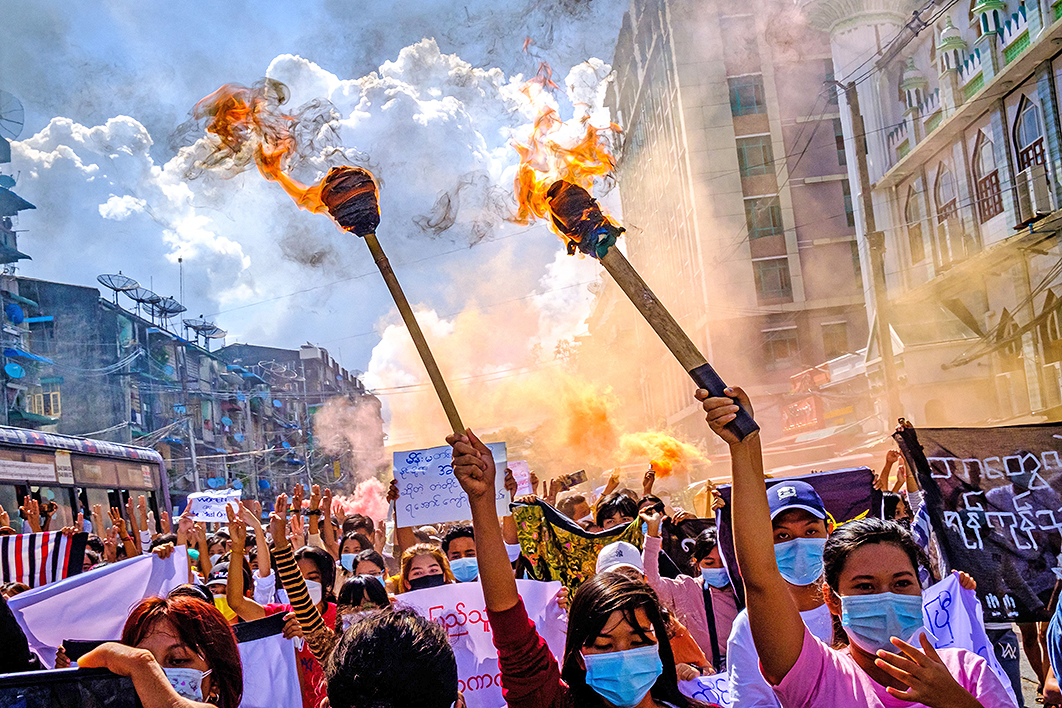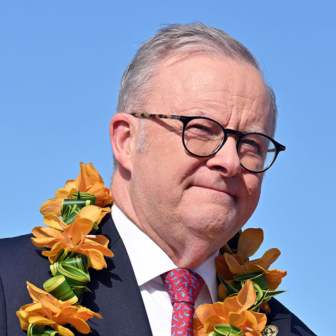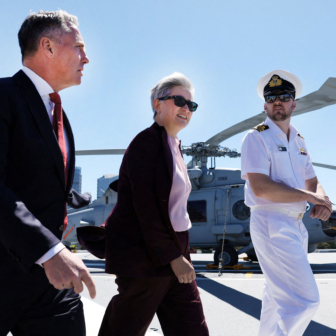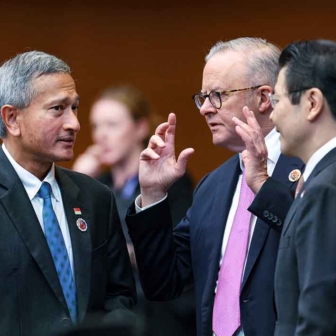Senior general Min Aung Hlaing is unlikely to be planning to shift any of his wealth into Australian shares or a Margaret River bolthole, or to export jade and rubies from his military-controlled mines. But even if he were, the Australian government’s leadfooted response to the coup he led on 1 February this year suggests he wouldn’t fall foul of sanctions.
The Myanmar armed forces, the Tatmadaw, overthrew the civilian government of Aung San Suu Kyi following its sweeping electoral victory, bringing to an end the constitutional progress started a decade ago by Min Aung Hlaing’s military predecessors. Since the coup, soldiers have killed more than 800 demonstrators.
Adding to the cynicism of the whole affair, Min Aung Hlaing seems to have calculated that Suu Kyi’s lowered international standing — an ironic result of her defence of the Tatmadaw’s ethnic cleansing of the Rohingya minority — meant her toppling would not be greatly regretted by the outside world. The general’s claims of election fraud were a Burmese translation of those being made by Donald Trump. Myanmar was facing no national crisis at the time: the coup was all about his ambition and the Tatmadaw’s dominance.
Coming up to six months after the coup, the Australian government is still in two minds what to do. Should it join the United States, Canada and European nations in applying sanctions against Myanmar military figures and military-controlled businesses? Should it go as far as the Czech Republic, which has recognised the National Unity Government declared by the ousted civilian leadership? Should it work alongside the Association of Southeast Asian Nations’s softly-softly engagement while using bilateral contacts as leverage?
So far, the government has inclined to the last, safest option. But ASEAN is split between those with elected governments, like Indonesia and Singapore, urging harder pressure on their fellow member, and those with authoritarian regimes taking a tolerant attitude to the coup.
Australia’s military was directed to maintain contact with the coup leaders. Vice-admiral David Johnston, the deputy defence force chief, has had two phone conversations with his Myanmar counterpart, vice-senior general Soe Win, urging restraint and pressing for the release of the Australian economist Sean Turnell, an adviser to Suu Kyi. Turnell remains in Yangon’s Insein jail, now formally charged with revealing state secrets, one of the crimes with which Suu Kyi is also charged. The Tatmadaw trumpeted the conversations with Johnston as a step towards Australia’s acceptance of the coup.
An Australian version of the “Magnitsky Act” — the US legislation that initially applied financial sanctions to Russian leaders and kleptocrats but has since been used against figures in Myanmar and elsewhere — is yet to come before parliament, despite the bipartisan recommendation of a joint parliamentary committee last December. And the government doesn’t appear to have wielded its existing migration and foreign investment powers.
The listless response is not for lack of interest in Australia. About thirty federal members and senators across party lines belong to a Myanmar friends group, and the joint committee was quickly set up to analyse Australia’s response to the coup.
“That’s a level of parliamentary activity which is rare in this country,” says Chris Lamb, a former ambassador to Myanmar and president of the independent Australia Myanmar Institute, which is backed by several universities. “And there’s been very little response to that. It’s a country that probably has more political engagement at backbencher level than any other.”
The policymaking rooms of Canberra appear to be gripped by doubts that sanctions have any point beyond symbolism. In a joint committee hearing in April, Defence official Hugh Jeffrey saw no “silver bullet” in sanctioning the military. “The Tatmadaw is an institution that has been remarkably impervious to international influence,” he said. “We also need to provide options that incentivise the return to liberal-democratic governance.”
In the prime minister’s office, Scott Morrison’s national security adviser, Michelle Chan, is a former ambassador to Myanmar. Her term there in 2008–11 covered the transition from outright military rule to the present constitution, which gives the Tatmadaw blocking powers in parliament and control of key security ministries. An internal backlash against Chinese influence had prompted military overtures to Suu Kyi as an alternative to continuing Western ostracism.
“Targeted sanctions mostly do not work — they’re very much a political response,” says Trevor Wilson, one of Chan’s ambassadorial predecessors in Myanmar. “Look at the history, look at the facts,” he adds, citing Yugoslavia and other examples. “There’s no evidence whatsoever that targeted sanctions work.” But he admits he doesn’t have a better solution. “Certainly I don’t think we should go the other direction of approving the military coup,” he says.
Among the supporters of targeted sanctions is the Australia Myanmar Institute, which is aware that figures within government believe sanctions achieve no results and remove the possibility of leverage. “To which my answer is: what leverage?” says Lamb. “When you see Vice Admiral Johnston speak to his counterpart in Myanmar and see nothing happen, where is the leverage and where is the benefit?”
In fact, says Lamb, it’s hard to see what would be lost by applying sanctions. “The kind of sanctions we are talking about would be pretty narrowly targeted to a pretty small group of leading people in the military and their assets,” he adds. “I think you get your best leverage by showing the decent people in the army that there is a future for them in the country.”
Janelle Saffin, a former federal MP now in the NSW state parliament, is a long-time friend of Suu Kyi and influential in Labor policymaking. She thinks that if sanctions reduced Australia’s leverage in relation to cases like that of Sean Turnell, any loss would be insignificant.
“If I want sanctions I’d want them to be directed, targeted and meaningful,” she says. “I wouldn’t even go for Min Aung Hlaing; I’d go for the coterie around him who all get wealthy through him. I’d put judges in it, like the judge hearing the case against Suu Kyi. Other people, diplomats who spread slander that protesters are terrorists. If I was doing sanctions I’d do them so they hurt people who were culpable.”
While not going as far as formal recognition of the provisional anti-coup government, Saffin says Australia could step up “engagement” with the ousted civilian government. It could lobby the United Nations to maintain the accreditation of Myanmar ambassador Kyaw Moe Tun, who came out strongly against the coup.
In the meantime, says Saffin, Canberra is “hiding behind” ASEAN, and not even speaking as clearly against the coup as Indonesia and Singapore. If and when the regional grouping gets to appoint a special envoy on Myanmar — a step adopted at an ASEAN summit in April but since stalled — she believes Australia should weigh in.
Lamb agrees. “There’s no reason why Australia shouldn’t be speaking like the Indonesians and Singaporeans,” he says. “Both of them have their ministers out there saying things. Not us.”
If the chosen envoy is a Thai, as rumour suggests, Canberra should not assume this would lead to a whitewash of the coup, says Saffin. The current Thai prime minister, Prayut Chan-o-Cha, is a former general who came to power through a coup himself. The Thais would not want to be seen as a “pushover,” says Saffin. Australia should be using its considerable influence in Bangkok, enhanced by the new “strategic partnership” signed last November by Prayut and Morrison.
All these experts lament the rupture of bilateral dialogue with China, which has maintained relations with the Tatmadaw but must be alarmed to see its southern neighbour drifting deeper into domestic conflict and potentially transnational crime. One sign of China’s hedging was an invitation to Myanmar’s National League for Democracy to send delegates to the recent centenary celebrations of the Chinese Communist Party, which it did.
“It ought to be possible for grown-ups like Australia and China to separate the bilateral things that cause us so much grief and talk sensibly about a country like Myanmar,” says Lamb. “And if not directly, to do it through surrogates.”
Australia did have a call for a return to democracy inserted in the statement by the “Quad” summit in March, notably putting India and Japan more firmly on side against the coup. It is also understood to have helped extricate a number of political fugitives from Myanmar.
The position of some 1500 students from Myanmar here on study visas is meanwhile fraught with uncertainty, with Home Affairs proposing to transfer them to temporary protection visas when their study visas expire. No post-Tiananmen Bob Hawke gestures here. Within the Myanmar community, some finger-pointers are targeting the children and other relatives of figures working back home with the military regime.
Canberra’s diffidence is sending signals of its own. “I don’t see that having no discussions about sanctions, or producing the kinds of answers that Australia does, can do anything more than give some reassurance to the generals in Myanmar,” says Lamb. “What we do is also the counterpart to what we don’t. Not doing something is itself a statement.” •




